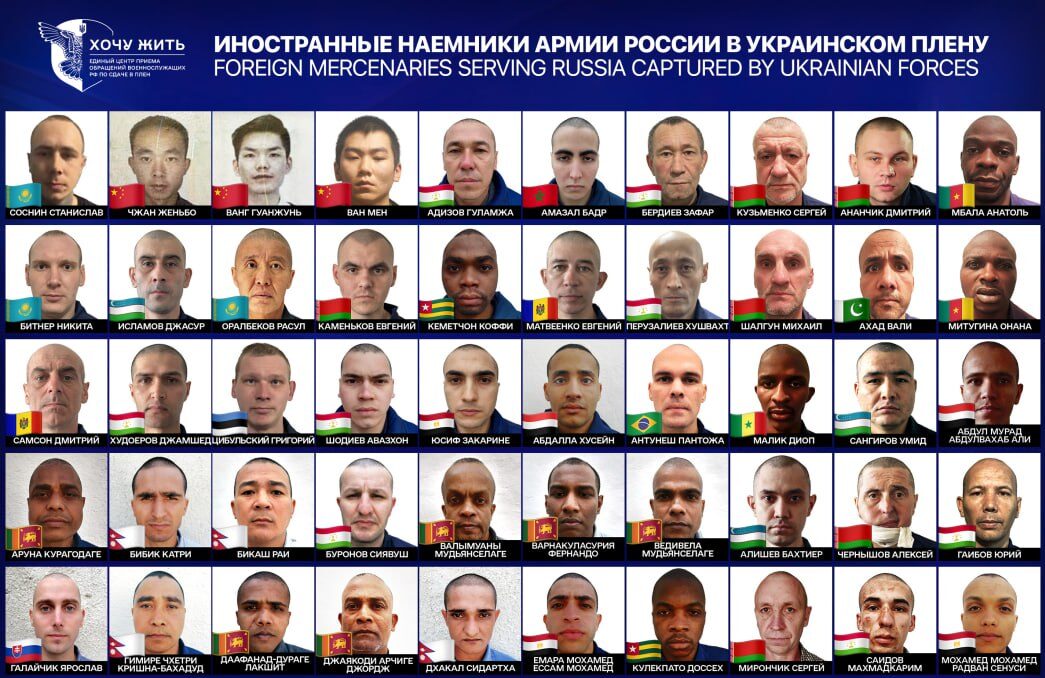Ukraine currently detains more than 100 foreign mercenaries from 33 countries who were recruited to fight for Russia, according to the I Want to Live project from Ukraine’s Coordination Headquarters for the Treatment of Prisoners of War on 1 August 2025.
The captives show Russia’s expanding global recruitment drive, while Moscow abandons foreign fighters by excluding them from prisoner exchanges despite Ukraine treating all detainees according to international standards.
The captured fighters include citizens from Cameroon, Morocco, Somalia, Senegal, Egypt, and dozens of other nations recruited through Russia’s expanding global recruitment network, according to the I Want to Live project.
The scope of foreign captives exposes Russia’s systematic recruitment from economically vulnerable populations worldwide, with Moscow’s promises of wealth and stable careers leading fighters into Ukrainian POW camps where Russia shows no interest in their release.
Russia’s global recruitment reaches 121 countries
The Coordination Headquarters reports that Russia has recruited fighters from 121 countries since launching its full-scale invasion in February 2022. The I Want to Live project, which encourages voluntary surrender, stated that “Russia actively bribes, deceives, and coerces individuals from neighboring Central Asian countries and more into signing contracts.”
The photographs of mercenaries released by Ukrainian authorities represent only a fraction of foreign fighters captured during what the Coordination Headquarters called Russia’s “meat grinder” assaults. Many were recruited through false promises of non-combat roles or civilian employment, only to be deployed directly to front-line positions within days of arrival.
Previous reporting by BBC Russian Service documented over 500 foreigners from 28 countries killed while fighting for Russia, with the actual numbers likely significantly higher due to incomplete record-keeping of non-Russian casualties.
Standard treatment despite abandoned status
The foreign prisoners receive the same treatment as Russian soldiers in Ukrainian prisoner-of-war camps, according to the I Want to Live project. “They sleep in the same facilities, receive the same food and medical care, and have access to representatives of the International Committee of the Red Cross,” the project stated.
Some countries have sent embassy staff to visit their detained citizens, though Russia has shown no interest in including foreign fighters in prisoner exchanges. “For Russia, these fighters are considered ‘third-rate’ and hold no value to Moscow while in captivity,” the Coordination Headquarters stated.
Ukrainian officials have repeatedly stated their commitment to Geneva Convention obligations in treating detainees, contrasting sharply with documented treatment of Ukrainian prisoners in Russian custody, where international monitors report systematic torture and denial of medical care.
Recruitment targets economic desperation
Russia’s recruitment strategy particularly targets migrants and students from economically challenged nations. Forbes Ukraine reported in May 2024 that Russian recruiters operate in at least 21 countries, using databases of foreign nationals who previously sought employment in Russia.
The recruitment extends across continents, from Central Asian republics like Tajikistan and Uzbekistan to African nations including Burkina Faso, Mali, and the Central African Republic where Wagner Group maintains military bases. Cuban authorities have issued conflicting statements about their citizens’ participation, while Nepalese and Indian nationals have been documented among both casualties and prisoners.
Ukrainian President Volodymyr Zelenskyy stated in August 2025 that Ukrainian forces reported encountering mercenaries from China, Tajikistan, Uzbekistan, Pakistan, and African countries, adding that “we will respond” to this escalating threat.
Exchange complications and repatriation challenges
The presence of foreign fighters complicates prisoner exchange negotiations, as Russia typically excludes non-Russian nationals from swap arrangements.
The case differs significantly from Ukrainian foreign volunteers, who serve under official military contracts and maintain clear legal status under international humanitarian law. The International Legion for the Defence of Ukraine operates under direct Ukrainian military command, ensuring proper combatant status for its members. Ukraine has also announced plans to grant citizenship to foreign fighters serving in its Defense Forces and their families.
With intervention from international organizations and home countries, some foreign fighters may eventually return to their homelands, though the Coordination Headquarters warned that “their stories serve as a warning to other money-seekers: Putin’s war devours everyone indiscriminately, and being a mercenary in the Russian army means becoming expendable in a foreign criminal war.”
The growing number of foreign captives highlights Russia’s increasing dependence on external recruitment as domestic mobilization efforts face issues and the conflict’s casualty toll continues rising after more than three years of warfare.




